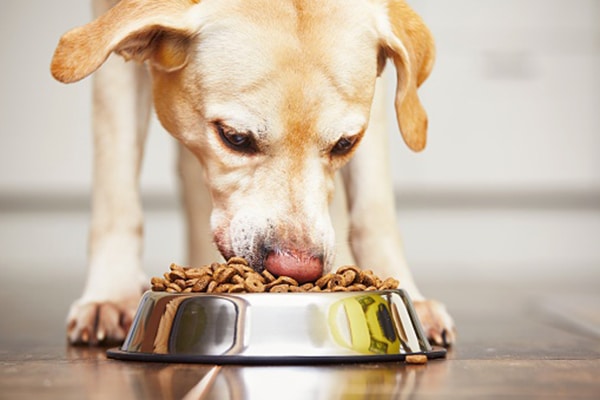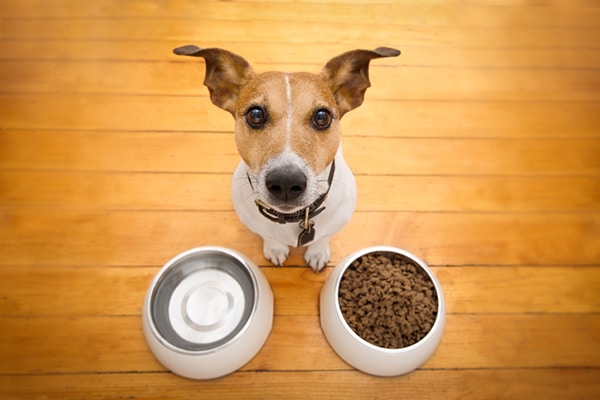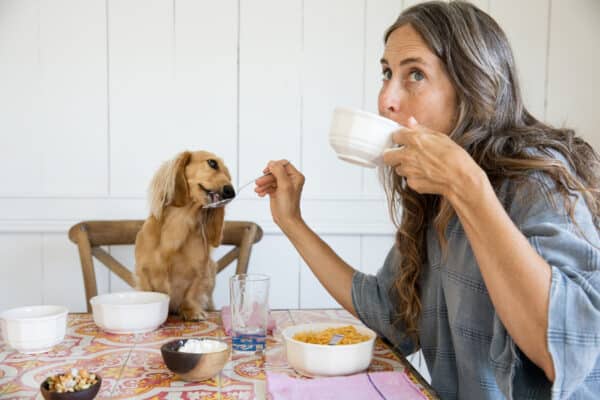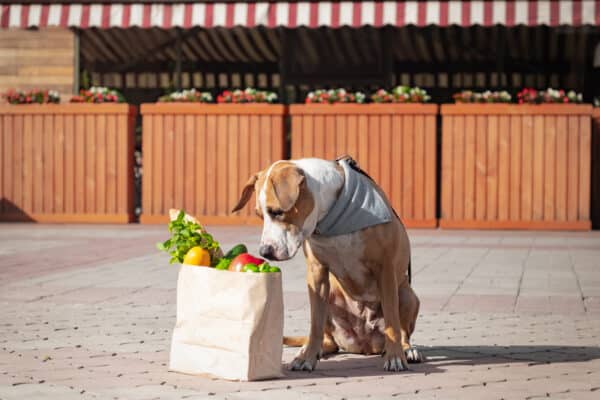Have you ever thought, “How often should I feed my dog?” Dogs thrive on routine and, though they do not keep track of time like we do, their circadian rhythm, or internal clock, makes it possible for them to tell when it’s close to the time for a routine task. Whether you’ve just adopted a dog (congrats!) or are wondering about how much to truly feed your pup, we bet you’ve thought, “How many times a day should a dog eat?” at some point. We’ve put together a dog feeding schedule for adult dogs, puppies, senior dogs, active breeds and sedentary breeds, configured around each dog’s play, activity, sleep and water schedules.
Remember: Any dog feeding schedule is just a suggestion. The best way to plan a dog feeding schedule is to consult with a vet, who can configure a dog feeding schedule that’s customized to your dog’s needs.
Sample Dog Feeding Schedule for an Average Day with an Adult Dog

Food: A dog feeding schedule for most adult dogs should include time to eat twice a day. This keeps their metabolism stable and aids in digestion. You’ll find they quickly catch on to when feeding time is. A sample dog feeding schedule for adult dogs would be:
- 7:00 a.m. – Breakfast
- 6:00 p.m. – Dinner
Water: The next step after establishing a good dog feeding schedule is a having a schedule for offering fresh water to your dog. In general, it is best to leave a fresh bowl of water out for your dog every morning and every evening. Dogs should always have clean water after any activity. If you’re working on housetraining or have a dog who overdrinks, you can schedule the amount and times you provide it. But watch your dog carefully and, if he seems to be thirsty, increase the amount. A sample schedule for monitoring water would be:
- 7:00 a.m. – Clean and fill bowl half-way.
- Noon – Rinse out and refill half-way.
- 6:00 p.m. – Rinse and fill half-way.
- Bedtime – Clean and fill bowl about 1/4 of the way.
Sleep: An average dog sleeps about 14 hours a day. Unlike humans, they sleep for shorter times more frequently. A dog’s REM cycle is more active than a human’s and may explain the phenomenon of “chasing in their sleep.” If your dog sleeps more than 16 hours a day, it is wise to check for any illness. By scheduling his activities throughout the day, you will naturally create a good sleeping routine.
Play: Play is imperative to keep a dog’s skills honed, to provide stimulation and just to have fun. Play can mean a game of fetch with you, a board game where your dog has to do tricks to earn a turn, a doggie play date, or even interactive toys when you are away. Try to get two play sessions in a day. A sample schedule would be:
- 8:00 a.m. – Spend at least 15 minutes playing with your dog
- 4:00 p.m. or Right after work – Schedule a play date or try something creative like a game of hide and seek
Activity: Activity is imperative for a dog’s mental and physical health. Ideally, a dog should be walked twice a day for 30 minutes. An extra walk does no harm and, in fact, will benefit you both. In our hectic society, however, this can be tough, so consider enlisting the help of a dog walker. Also keep in mind activities other than walking such as the dog park. A sample schedule would be:
- 6:30 a.m. – Walk your dog before his breakfast
- Noon – Walk your dog (this is where a dog walker could be helpful)
- 5:00 p.m. – Walk your dog before his dinner
Together Time: A dog feeding schedule isn’t the only thing you should establish. Together time is a bonding experience for you and your dog. This is the easiest thing to schedule as it can be on the couch while watching T.V. or outside reading a book, or on the bed at the end of the night. The key is to focus on your dog and pet and massage him. Dogs love a light massage and many are happy with your foot stroking their back. Even just sitting touching your dog is a bonding activity.
Dog Feeding Schedule for Puppies
Housetraining: With puppies, there is housetraining to consider in your dog feeding schedule. When beginning housetraining, you or someone you trust, such as a dog sitter, really needs to be on hand frequently, so you can catch your pup before or in the act and rush him outside. Older puppies can go between three to four hours between elimination. A sample schedule would be:
- Outside upon waking.
- Outside after breakfast.
- Outside around noon after second feeding.
- Outside around 4:00 p.m.
- Outside after dinner.
- Outside before bed.
Food: A puppy will ideally eat three times a day so schedule in a feeding around noon. Get a dog sitter to help if needed.
See a more comprehensive guide for feeding puppies here >>
Sleep: A puppy sleeps more than an adult dog, averaging about 16 hours a day. But some will sleep for up to 20 hours!
Activity: A puppy will have bursts of energy and then flop down where he is and sleep. Try to get your puppy out as much as you can, starting with short walks and building up to 20 minutes.
Dog Feeding Schedule for Senior Dogs
Food: A good dog feeding schedule for senior dogs is feeding twice a day. Feed senior dogs smaller amounts since their activity is limited.
Water: Older dogs may need more water than their younger counterparts.
Sleep: A senior dog will sleep more than an active adult dog, on average 16 to 18 hours a day. Just like humans, the older a dog gets, the more his needs resemble that of a puppy.
Activity: It’s important for a senior dog to still get walks and mild activity. Ideally, you, or a sitter, could take your dog out three or four times a day for shorter walks. Avoid excessive activity and any rough play such as at dog parks.
Dog Feeding Schedule for Active Breeds
There are a few modifications on a dog feeding schedule for active dog breeds such as the Border Collie, the Vizsla and any Terrier. Sleep for these dogs is often less than an average breed and you will find they are usually running around even when dozing. It can help to feed these breeds three times a day because their metabolisms are higher.
Dog Feeding Schedule for Sedentary Breeds
Breeds that are very large such as the Mastiff and the Great Dane tend to sleep more than an average sized dog. Some of the large breeds, such as the Greyhound and many of the hounds, do as well. A sample dog feeding schedule is also often different with these types of dogs being fed only once a day since they are not burning off as many calories.
The bottom line on figuring out a dog feeding schedule
Every dog is unique and you may have to alter a dog feeding schedule depending on your dog’s activity level. You also may need to adjust your dog’s schedule to meet yours.
The things to keep in mind are that a dog will need something scheduled every two – four hours, whether feeding, activity or playing. And consistency is key to keep you on schedule and your dog happy.
Tell us: What dog feeding schedule do you follow? How does your dog feeding schedule correlate to his activity, sleep and play schedules?
Concerned about your own meal schedules and what to eat? Check out these meal suggestions for boosting energy >>
Read more about dog food on Dogster.com:
- Let’s Talk Dog Nutrition — 6 Essential Nutrients Dogs Need
- 5 Easy Dog-Friendly Recipes
- 6 Tips to Slow Down a Dog Who Eats Too Fast
About the author: Formerly Dog Fancy, Dogster is a dog magazine and dog website where dog lovers come together and get expert advice on everything from dog breeds and dog barking to dog poop issues and dog cancer treatments. Subscribe to our magazine at dogster.com/subscribe. Contact us here. Or, check out Dogster’s online community.
Featured Image Credit: damedeeso/Thinkstock.





